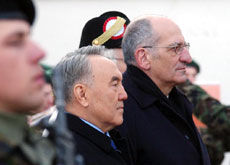Mixed reactions to Kazakh talks

Human rights groups in Switzerland are split over government talks with Kazakh president, Nursultan Nazarbayev.
Some insist ministers should have refused to meet Nazarbayev because of his poor human rights record. But others welcomed the talks.
“It’s very important to maintain a dialogue,” Andrea Huber, deputy secretary general of Amnesty International Switzerland, told swissinfo.
“It’s very important for the Swiss authorities to address Kazakhstan’s human rights problems and this meeting has given them the chance to talk about them to the country’s president.”
On Monday, Nazarbayev met the Swiss president, Pascal Couchepin, the economics minister, Joseph Deiss, and the foreign minister, Micheline Calmy-Rey.
Trade relations topped the agenda with two treaties being signed aimed at boosting bilateral economic relations.
Money laundering
Even though Couchepin confirmed that human rights had also been part of the discussions, Hanspeter Bigler, secretary general of the Swiss branch of the Society for Threatened Peoples, remained doubtful about whether the talks should have taken place.
“We are very concerned that the government has welcomed a man accused of money laundering,” he told swissinfo. “We’re talking here about more than $120 million – and that is a lot of money.”
Last year Switzerland froze the bank accounts of Nazarbayev and two former Kazakh prime ministers on suspicion of money laundering.
They are accused of accepting kickbacks from United States’ petrol companies in return for lucrative contracts in the oil-rich state.
Human rights
Bigler considers Nazarbayev’s human rights record and political repression to be just as worrying as the allegations of corruption, and is disappointed the three Swiss cabinet ministers went ahead with the talks.
“We would have liked the Swiss government to have made a symbolic gesture and not to have welcomed this man,” he said.
Although he admits that closer economic ties are a way of encouraging other countries to improve their human rights records, Bigler maintains that the Swiss government should have set different priorities.
“As they have spoken to him, they should have made human rights the main issue and not improvements in economic relations between the two countries,” he said. “The priority must be human rights questions, and afterwards we can discuss economic development.”
Death penalty
Huber agrees that Kazakhstan has a long way to go towards improving its human rights record.
Although no official government statistics are available, Amnesty International reports show that the former Soviet republic still has the death penalty and last year over 30 people were executed and three were sentenced to death.
Huber says that family members of death row inmates often receive no notice as to when an execution will take place.
Many learn only several months later that their relative has been killed, and in many cases the body has been buried in an unmarked grave.
Justice
Another worrying human rights aspect in Kazakhstan, according to Huber, is the judicial system. “The Supreme Court seems to be willing to accept testimony received by force – in other words under torture.
“It’s very important that pressure is put on all Kazakh courts to reject torture as an acceptable means of guaranteeing a statement.”
But Huber maintains that by meeting Nazarbayev, the Swiss government has kept open channels of communication and will also be able to act as a role model.
“It will be interesting for Nazarbayev to see how Switzerland abolished the death penalty,” she said.
“There are many nations looking for better economic relations and it should be clear to them that being part of a wider economic net brings some duties – and one is to respect international human rights standards.”
swissinfo, Jonathan Summerton
December 1991 – the former Soviet republic becomes an independent state.
December 1, 1991 – Nazarbayev is elected president.
During his term Nazarbayev expands his powers: only he can initiate constitutional amendments, appoint and dismiss the government, dissolve Parliament, and call referenda at his discretion,
January 10, 1999 – Nazarbayev re-elected as president for a second term.
Population – 16.7 million

In compliance with the JTI standards
More: SWI swissinfo.ch certified by the Journalism Trust Initiative

You can find an overview of ongoing debates with our journalists here. Please join us!
If you want to start a conversation about a topic raised in this article or want to report factual errors, email us at english@swissinfo.ch.